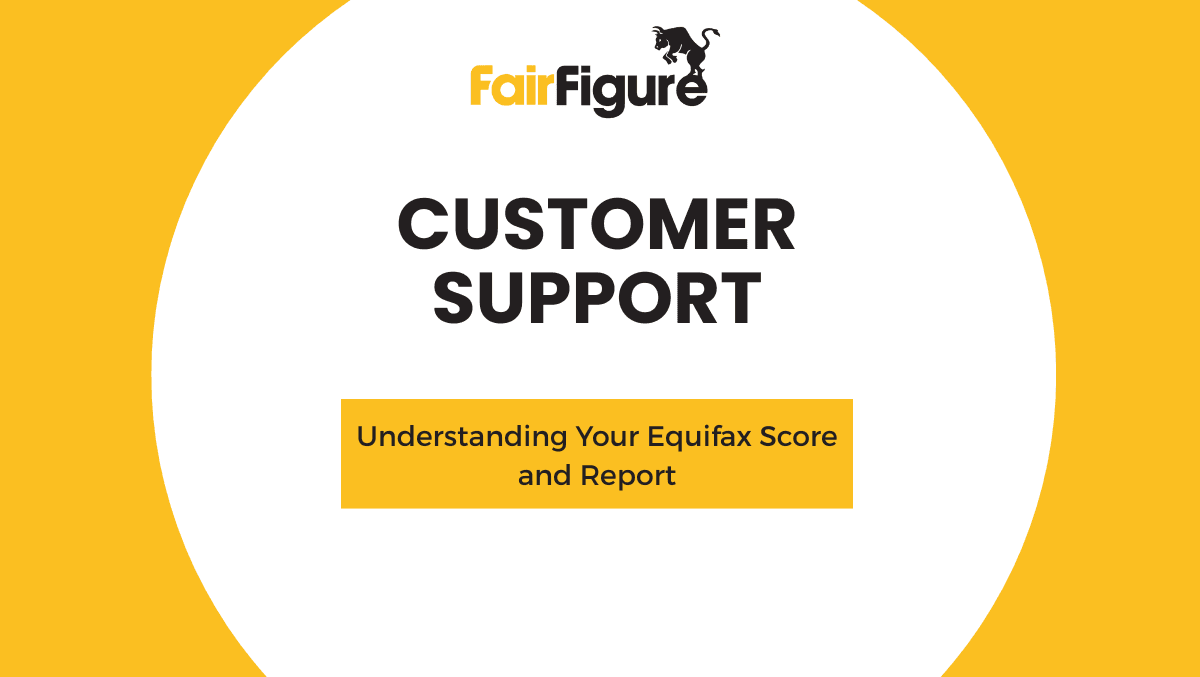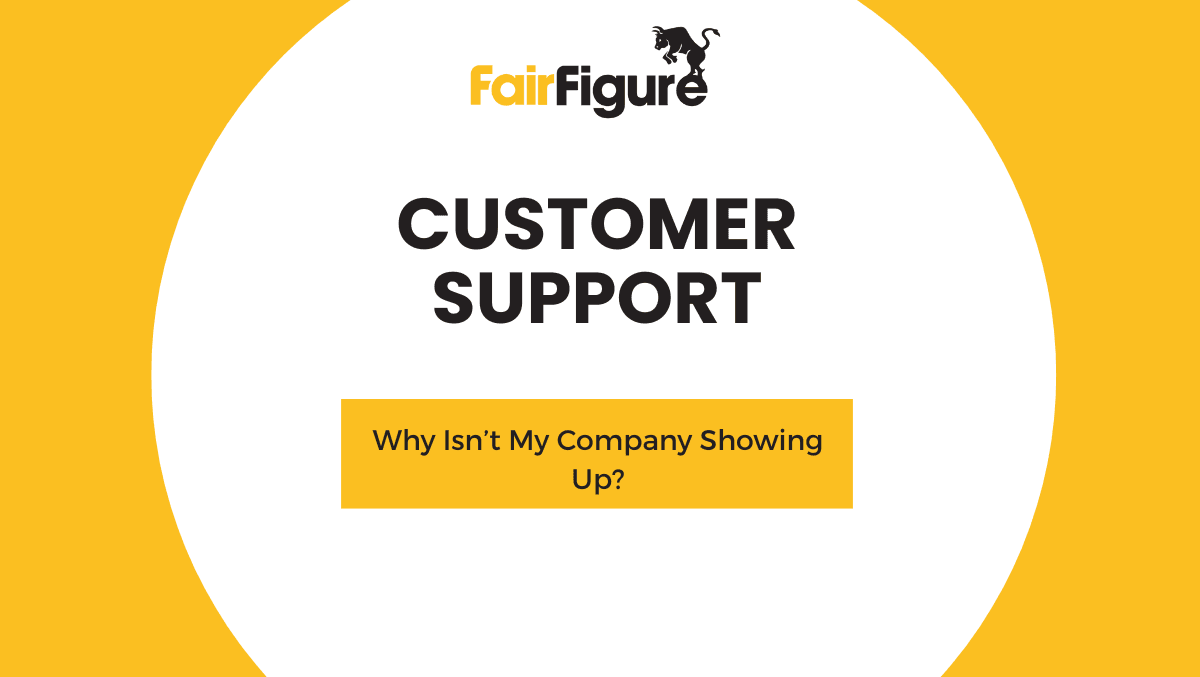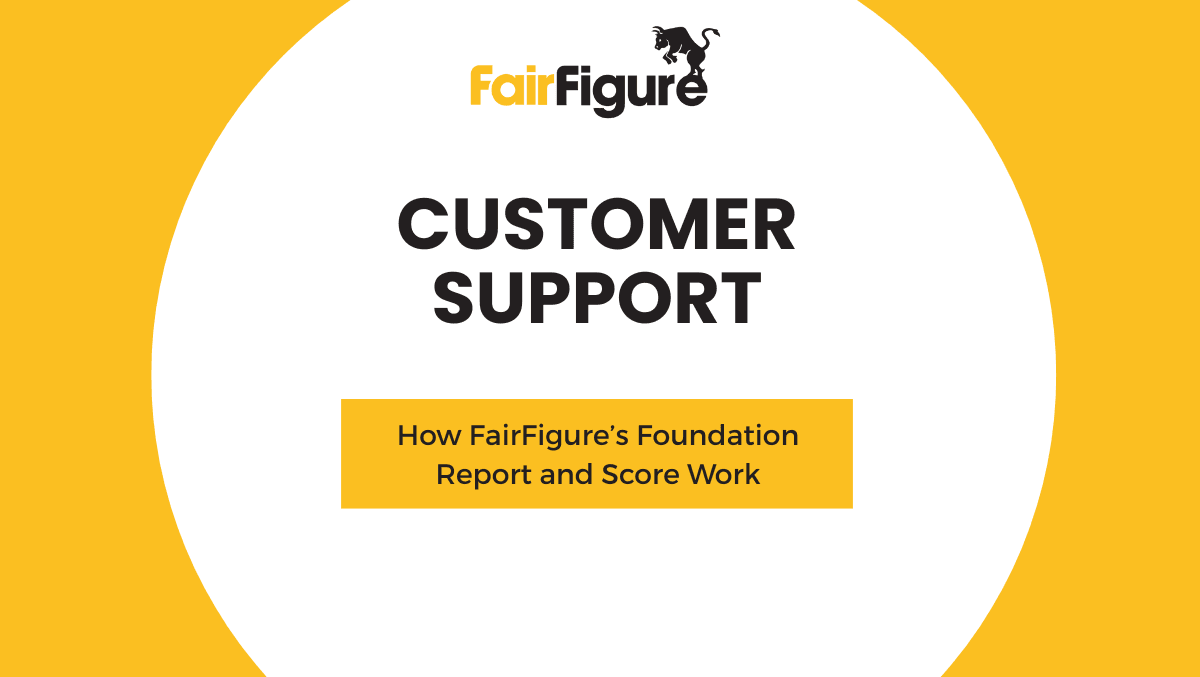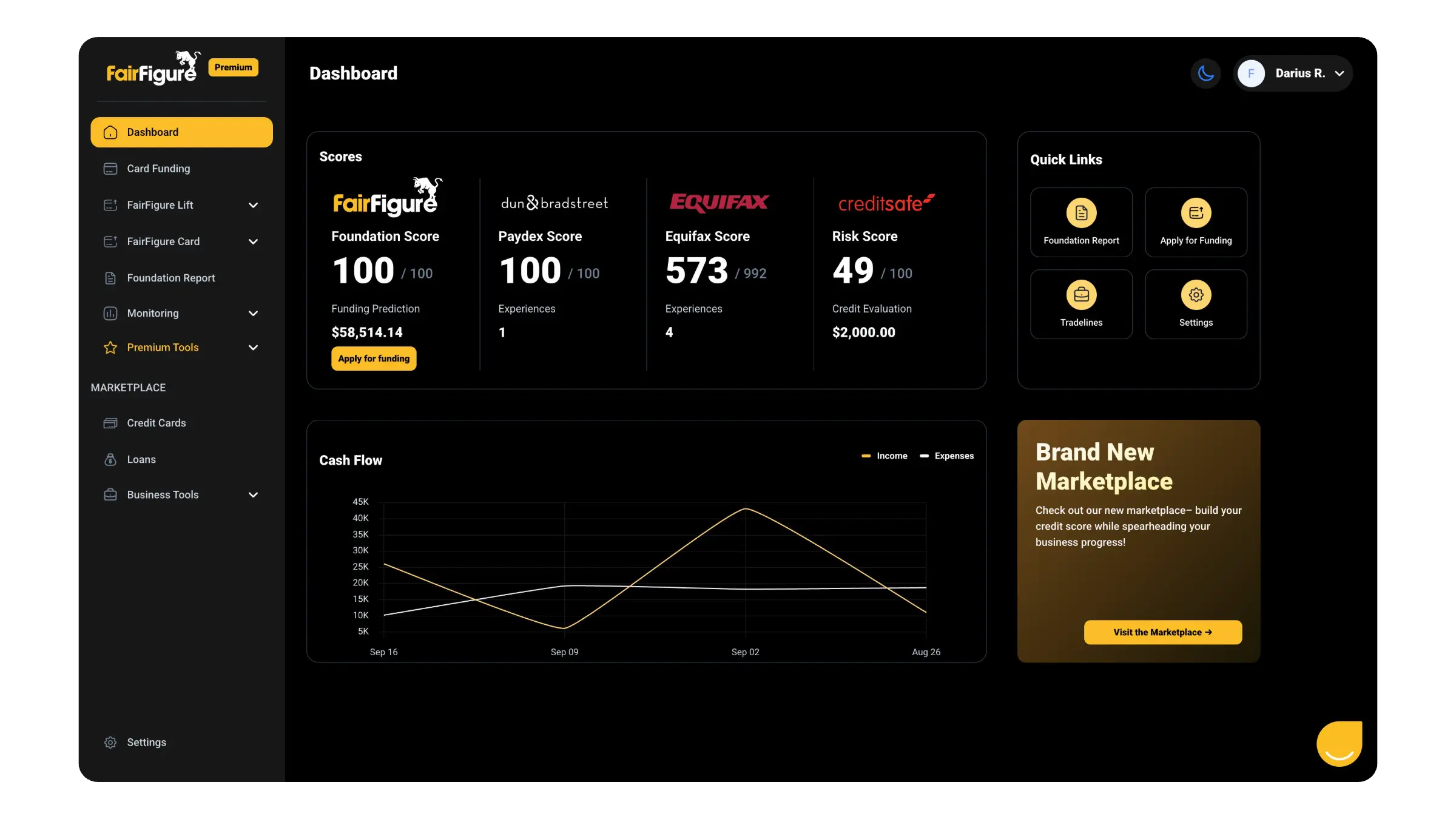Which Business Credit Cards Do Not Report Personal Credit? The Best Options
Author: Nick Alex Gallo
December 03, 2024
14 min read
TABLE OF CONTENTS

Start your credit building journey for your business

Business credit cards that don’t report to the personal credit bureaus can help you finance purchases, earn cash back rewards, and build business credit without risking your personal credit score or finances. (Keep in mind that we also wrote about which business credit cards report to the business credit bureaus, if you'd like this flip side of this subject.)
Let’s explore the best options in 2024.
The Best Business Credit Cards That Do Not Report to Personal Credit
- FairFigure Capital Card
- Mercury Mastercard IO Card
- PNC
- ARCO Fleet Card
- Stripe Corporate Card
- Wells Fargo
- U.S. Bank
- Citi
- Bank of America
- BILL Spend & Expense
- American Express
1. FairFigure Capital Card
The FairFigure Capital Card is a true EIN-only business credit builder card. FairFigure won’t report any of your activities to a consumer credit bureau, whether positive or negative. The capital card doesn’t appear in your personal credit report.
In fact, the FairFigure card doesn’t involve your personal credit at any point. You don’t have to sign a personal guarantee or even undergo a personal credit check, making it one of the few legitimate EIN-only business cards.
Your business revenue is the basis for your credit limit. As long as your business is at least three months old with $2,500 in monthly recurring revenue, you’re generally eligible for a credit line.
Keep in mind that FairFigure’s business card isn’t technically a credit card. But it is a business card that gives you access to capital.
Besides protecting your personal credit, the FairFigure Capital Card also offers some significant benefits, including:
- Extra vendor tradeline: To access the Capital Card, you must subscribe to FairFigure’s Credit Builder Plus subscription for $30 per month, which gets reported to the business bureaus as a vendor tradeline.
- Business credit monitoring: FairFigure’s subscription also includes business credit monitoring services. You can access your Equifax and CreditSafe business scores and reports, plus FairFigure’s proprietary Fundex score and Foundation Report.
FairFigure reports your credit account as a financial tradeline and your subscription payment as a trade credit account to Equifax Business, CreditSafe, and the Small Business Financial Exchange (SBFE).
2. Mercury Mastercard IO Card
The Mercury MasterCard IO Card is another small business credit card that won’t appear in your consumer credit reports. The credit card company won’t share your positive or negative activities with any personal credit bureau.
Also, Mercury doesn’t require a personal guarantee or a personal credit check when you apply, so there’s no risk to your personal credit score at any point. In fact, Mercury won’t check your business credit score either.
Instead, the primary qualification requirement is a security deposit. You must sign up for a Mercury bank account and maintain an average balance of at least $25K to be eligible for the IO card. Once you receive your credit line, it works like a charge card rather than a traditional business credit card.
Mercury will automatically deduct your card balance from your Mercury account each pay period, which can be daily or monthly, depending on your average Mercury cash balance.
Because you can’t carry a balance from one period to another, Mercury never charges interest, and there are no recurring fees. However, you can earn unlimited 1.5% cash back on all purchases, which automatically gets deposited into your Mercury account.
Mercury can also help you build business credit. It reports the IO card to Dun & Bradstreet (D&B) and Equifax Business.
3. PNC
PNC Bank doesn’t report positive or negative credit activities to the personal credit bureaus. However, it may pull your credit or ask you to sign a personal guarantee when you apply for a business credit card.
PNC offers nearly half a dozen business credit cards, which include the following:
- Cash Rewards Visa Signature Business Credit Card
- Visa Business Credit Card
- Points Visa Business Credit Card
- Travel Rewards Visa Business Credit Card
- BusinessOptions Visa Signature Credit Card
Each of these accounts has something valuable to offer, but the Cash Rewards Visa Signature may be the most well-rounded.
It provides 1.5% cash back on all purchases, 0% APR for the first nine billing cycles, and a $600 bonus when you spend $6,000 in the first three months.
Additionally, PNC reports its business credit accounts to all three major commercial credit bureaus, including D&B, Equifax Business, and Experian Business.
4. ARCO Fleet Card
ARCO offers two separate commercial fleet cards, but the only real difference between them is that one’s a Mastercard and is more widely accepted. You can use it at all fuel locations that take Mastercard and pay for maintenance services on your vehicles.
The other is only usable at participating ARCO locations in the United States.
Otherwise, the two ARCO fleet cards are virtually identical. Most notably, ARCO won’t report your positive or negative activities to the personal credit bureaus. You don’t have to sign a personal guarantee to apply either.
However, ARCO will check your business credit score, and you’ll need a good one to qualify. You’ll also need to meet their time-in-business requirements, which usually start at two or more years of operational history.
If you meet ARCO’s eligibility requirements and secure one of its fleet cards, you’ll earn cash back at a rate of 15¢ per gallon for the first three months.
ARCO will also report your account to D&B, Equifax Business, and Experian Business, helping you build business credit.
5. Stripe Corporate Card
Stripe is a popular digital payment processor, and its corporate card can be a good option if you already use the software. Stripe won’t report your activities to the personal credit bureaus or require a personal guarantee.
Stripe doesn’t report to the major business credit bureaus either, but it does share your account data with the SBFE, building business credit that way.
Otherwise, the card’s primary benefits are its unlimited 1.5% cash back on all purchases and seamless integration with your Stripe account. That includes real-time expense reporting and a credit limit based on your payment processing history.
Meanwhile, its biggest drawback is that it functions like a charge card rather than a traditional business credit card.
Stripe automatically debits your bank account for the outstanding card balance at the end of each pay period, and failed payments may trigger fees.
In addition, Stripe’s corporate card is currently only available if you’re located in the United States and receive an invite.
6. Wells Fargo
Wells Fargo is a leading bank that doesn’t report positive or negative business credit activities to the personal credit bureaus for its card. It also reports to one of the major business bureaus, D&B, and the SBFE, helping you build business credit.
However, as of the time of writing, Wells Fargo only offers one business credit card, the Signify Business Cash Card. Fortunately, it has pretty attractive benefits, including:
- Unlimited 2% cash back on all business purchases
- 0% introductory APR for 12 months on purchases
- $500 cash bonus when you spend $5,000 in the first three months
In addition to meeting its business credit requirements, Wells Fargo may check your personal credit score or require you to sign a personal guarantee for the account.
You must be a Wells Fargo customer with a bank account that’s been open for at least two months to apply online. If you don't have one, you can make an appointment at a local branch to complete the application process in person.
7. U.S. Bank
U.S. Bank’s credit reporting policies are identical to Wells Fargo’s. It doesn’t report positive or negative credit activities to the personal credit bureaus, but it does share your account and payment details with D&B and the SBFE.
However, U.S. Bank offers more business credit card options than Wells Fargo, including the following:
- Business Altitude Power World Elite Mastercard
- Business Altitude Connect World Elite Mastercard
- Triple Cash Rewards Visa Business Card
- Business Leverage Visa Signature Card
- Business Platinum Card
All of these cards have excellent benefits.
For example, the Altitude Power card offers 2.5X points on up to $5,000 in mobile wallet purchases per quarter, 6X points on prepaid hotel and car rentals booked through the Rewards Center, and 2X points on all other purchases.
You also get 75K bonus points if you spend $10K in the first 120 days.
Because each account has unique pros and cons, it’s tough to say which is the best credit card. It depends on what’s most important to your business.
The Altitude cards may be best if you travel frequently, while the Platinum card might be better if you’re interested in financing a big purchase. It offers 0% APR for the first 18 billing cycles.
8. Citi
Citi’s credit reporting policies are as favorable as they get for business owners who want to build business credit without risking their personal credit history.
The bank reports to each major business credit bureau (D&B, Equifax Business, and Experian Business), but it doesn’t share positive or negative activities with the consumer credit reporting agencies.
However, Citi’s business credit card offerings are relatively limited. There are only two options to choose from:
- AAdvantage Business World Elite Mastercard
- Costco Anywhere VISA Business Card
If you travel regularly for business, the AAdvantage account may be the most lucrative option.
It offers two American Airlines AAdvantage miles for every dollar you spend on telecommunications, cable and satellite, car rentals, fuel, and certain American Airlines purchases.
You’ll also receive one AAdvantage mile for every dollar you spend on anything else, plus 65K bonus miles if you spend $4,000 within the first four months.
If you spend more at Costco than you do on travel, the Costco Anywhere Visa may be a better option.
It provides 4% cash back on your first $7,000 of fuel costs each year, 3% back on restaurants and travel, 2% back on other Costco purchases, and 1% back on everything else.
9. Bank of America
Bank of America is another major credit card issuer that doesn’t report positive or negative business credit activities to the personal credit bureaus. That’s fortunate because the bank also has a pretty extensive list of business credit cards.
If you have a limited business credit history or bad business credit, the Business Advantage Unlimited Cash Rewards Mastercard Secured Credit Card may be your best option. It’s easier to qualify for because it requires a security deposit of at least $1,000.
Despite being a secured card, it offers 1.5% cash back on every purchase. Additionally, once you’ve improved your business credit score, Bank of America will consider upgrading you to an unsecured credit line.
If you have good business credit, the Business Advantage Customized Cash Rewards Mastercard could be a better option.
It’s harder to qualify for, but it offers 3% cash back in a category of your choice, 2% back on dining purchases, and 1% back on everything else.
The 3% and 2% cash back rates apply to the first $50K in your chosen category and dining combined, but the 1% back is unlimited.
In addition, you’ll receive a $300 welcome bonus after you spend $3,000 in the first 90 days after opening your account.
However, Bank of America only reports to the SBFE and not any of the major business credit bureaus.
10. BILL Spend & Expense
Formerly known as Divvy, BILL Spend & Expense is a comprehensive expense management solution. It includes a corporate charge card that doesn’t get reported to the personal credit bureaus for positive or negative activity.
In addition, you don’t need to sign a personal guarantee or undergo a hard credit check to apply, though there will be a soft business and personal credit pull.
In addition to your personal and business credit, your eligibility primarily depends on your banking history. BILL analyzes your revenue, cash balances, and overall financial performance to underwrite your application and assign a credit limit.
If you qualify for a Spend & Expense credit line, you’ll be able to earn rewards for your spending at a rate that depends on your payment schedule. Here’s how it works:
- Weekly: 7X points on restaurants, 5X on hotels, 2X on software subscriptions, 1.5X everything else
- Semi-monthly: 4X points on restaurants, 3X on hotels, 1.75X on software subscriptions, 1X everything else
- Monthly: 2X points on restaurants, 2X on hotels, 1.5X on software subscriptions, 1X everything else
A BILL Spend & Expense line can also help you build business credit, as it reports to the SBFE and, as of more recently, D&B.
11. American Express
Unlike the other banks on this list, American Express reports negative business credit card activity to the personal credit bureaus, though not positive activities.
In other words, paying late or defaulting will damage your personal credit score, but building a good payment history won’t improve it. More importantly, using Amex business cards won’t affect your personal credit utilization ratios.
That said, American Express can still be a viable option, especially since it has over a dozen small business credit cards to offer. They provide a wide range of benefits, including cash-back rewards, sign-up bonuses, and 0% introductory APR periods.
As usual, the best business credit cards for you depend on your circumstances, but there are a few standouts. For example, the Business Platinum Card has the most impressive bonus offer of 200K points if you spend $20K in the first three months.
The card also provides 5X points on flights and hotels booked in AmexTravel, up to $400 back on purchases from Dell Technologies, 1.5X points on a few select categories, and 1X points on all other spending.
The Hilton Honors Business Card offers a slightly lower but still impressive 130K Hilton Honors points for spending $6,000 in the first six months.
It also provides a whopping 12X points for Hilton purchases, 5X points on other purchases, and up to $240 back per year on certain Hilton purchases.
Whichever business credit card you choose, American Express will report your activities to the SBFE and D&B.
Pros and Cons to Business Credit Cards That Do Not Report to Personal Credit
The primary advantage of a business credit card that doesn’t report to the consumer credit bureaus is that it protects your personal credit.
If your company suffers from cash flow issues that cause you to miss payments, the credit consequences are limited to your business.
In addition, these accounts are more likely to not require a personal guarantee or personal credit check. That can be beneficial in many ways, including:
- Limiting your personal liability for your business debt
- Keeping a hard inquiry off your personal credit report
- Helping you gain access to business credit with a bad personal credit score
For many business owners, the advantages of these cards outweigh the drawbacks, but that’s not to say that downsides don’t exist for certain business owners.
For example, not requiring a personal guarantee or credit check might be beneficial if you have a bad credit score, but it can also be an obstacle if you have good personal credit and weaker business finances.
Similarly, a business credit card that doesn’t report positive activity to the personal bureaus could be a missed opportunity to improve your personal credit score while building business credit.
Ultimately, credit card decisions are highly situation-dependent. Consider your personal and business creditworthiness, financial needs, and spending habits carefully before you commit to applying for an account.
More articles
Read More >
January 09, 2026
2 min read

January 09, 2026
2 min read

January 09, 2026
2 min read

Start your credit building journey for your business

Start your credit journey now with FairFigure